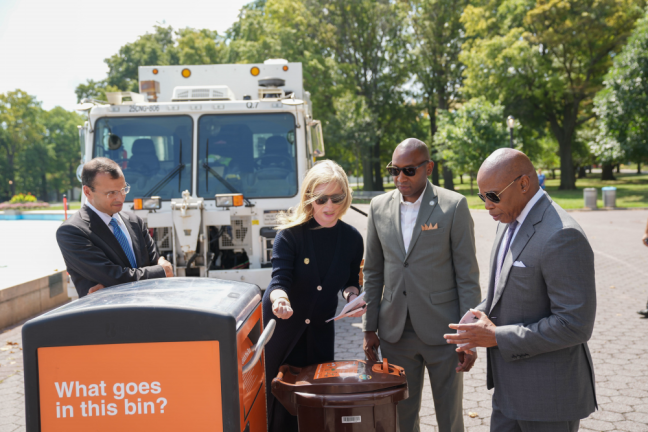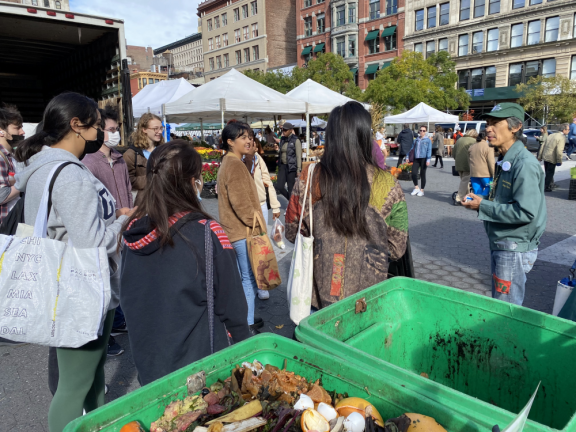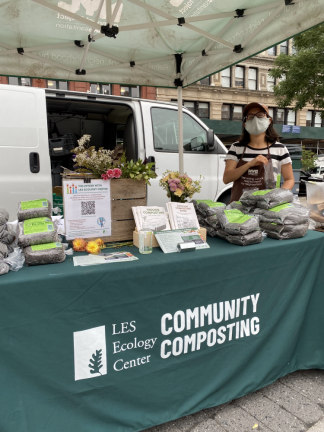From banana peels to eggshells, we all leave a multicolored mess of food waste in the trash daily. We throw out so much food that over one-third of edible products in the United States goes directly into the garbage, not only wasting food but the resources that produce it. Composting is one sustainable waste management technique that recycles these organic materials into the soil through the process of decomposition. Fruits, vegetables, dairy products, grains, and bread can be composted. Even biodegradable items like paper napkins, coffee filters, tea bags, newspapers, and cardboard can be thrown into the mix.
Composting in New York City has significant environmental benefits. The city produces 3,500 tons of organic waste every day. Most of this waste goes directly into landfills where it emits methane, a greenhouse gas that is more harmful to our planet than carbon dioxide. Separating food scraps from other garbage bins reduces the number of rodents that frequent city trash, a benefit amid the city’s growing rat problem. It also creates healthy soil for the city’s school gardens, street trees, and urban farms.
New Yorkers produce nearly 3.1 million tons of garbage every year but less than twenty percent of waste gets recycled. Though NYC falls behind many other major US cities in waste management, several City Council members, community organizations and the mayor himself are currently pushing for new composting efforts.
Curbside Collection Program
Due to concerns around landfill and sanitation, New York City instituted mandatory recycling laws and composting programs in the 1990s. Despite the city-wide need for effective food waste recycling systems, New York has since faced challenges with sustaining municipal composting initiatives.
Under Mayor Michael Bloomberg and Mayor Bill de Blasio, New York’s composting program expanded significantly. A curbside composting pilot service was rolled out in 2013 which placed brown collection bins around the city. By 2018, the city had the biggest composting program in the country servicing 3.5 million residents in five boroughs. Despite its reach, the program only picked up five percent of the food waste going into landfills. The curbside collection was placed on pause in 2019 to reevaluate the program in the hopes of enhancing efficiency.
The coronavirus pandemic placed a full stop to the city’s composting initiatives due to budget strains. The program was restarted during de Blasio’s last months in office but only seven of the fifty-nine community board districts participate in the program, including four in Brooklyn, one in the Bronx, and two in Manhattan.
When Mayor Eric Adams ran for office, he promised to bring curbside composting services to every neighborhood in the city. As mayor, Adams was forced to halt the composting expansion citing low participation and opting to save $18.2 million on his first budget. The service continues to run to the seven community board districts but less than four percent of households participate.
Low participation in the program has historically provided grounds for rollbacks but without a composting system in place as well as community education, engagement with composting simply can’t exist. After the pandemic, constituent requests to the Office of Council Members regarding composting sites have included emails stating, “Tons of food scraps are filling our garbage bins every day for the last two years. Our environment deserves better,” and, “With recent reports on sea level rise predictions ... we are looking at potentially devastating consequences for our city ... we should be increasing funding and be educating New Yorkers about composting so we can require it in five years similar to how we require recycling now.”
This May, New York City Council members Keith Powers, Sandy Nurse and Shahana Hanif introduced a bill that would make curbside composting a city mandate by the end of 2023. “With the universal residential composting legislation, almost every single New Yorker will have the ability to divert organic waste away from harmful landfills and toward regenerative and environmentally conscious composting facilities,” said Hanif in a press release about the zero-waste legislative package.
Other council members have started their own initiatives. Upper East Side Council Member Julie Menin partnered with environmental organization GrowNYC and Asphalt Green, a nonprofit fitness and sports organization, to install a composting site at the southeast corner of 91st Street and York Avenue.
“A third of the City’s residential garbage is organic waste,” said Menin. “It is important that we divert organic waste out of landfills and put the materials to a beneficial use.” By taking initiative on compost, the council member hopes to promote a greener future for all New Yorkers.
On August 8, Eric Adams announced the city would be piloting a curbside compost pickup across Queens starting in October. The city will provide brown bins for residents to deposit separated food scraps and yard waste which will be picked up by trucks on a weekly basis. The program will be a test for how the city can instate an effective universal composting system.
LES Ecology Center
Where city initiatives have fallen short over the years, community organizations and nonprofits have worked to start their own food waste projects. The nonprofit GrowNYC has run zero waste programs funded by the NYC Department of Sanitation since 2007, including food scrap drop-off sites. The Lower East Side Ecology Center also started a residential compost collection. The program originally started in 1990 and currently has nine sites for food scrap drop-offs including at Union Square and Tomkins Square Park.
LES Ecology Center used to process its own compost at East River Park but due to the ongoing East Side Coastal Resiliency Project, a $1.45 billion coastal protection initiative, the site has been closed for over a year. They currently coordinate with the Department of Sanitation to transport food waste to a facility in Staten Island which processes the city’s compost. LES Ecology Center is currently working on building a temporary site in Canarsie, Brooklyn, where they can produce their own compost to give back to community groups and gardens as well as use for their educational workshops.
Christine Datz-Romero, Executive Director of the LES Ecology Center, said there has been a significant consciousness shift around composting since they started the program in the 1990s. “There’s no shortage of people who want to participate,” said Datz-Romero. She said it’s all about making the system accessible and convenient as well as educating the community.
Composting is not only beneficial for the city, but Datz-Romero points out that it’s personally rewarding. Climate change is overwhelming, and people want concrete solutions they can incorporate into their daily lives where they can see their habits making an impact. “That’s what makes composting attractive,” said Datz-Romero. “It makes people feel good, it’s self-empowering.” The experience of returning food waste back into the local environment can provide a holistic connection with the earth that is often hard to access in big cities.
To start composting at home, Datz-Romero suggests repurposing a lidded container or finding a bucket for weekly food scraps. Food waste can be placed in the freezer during the week to reduce odors from particularly pungent food.
To find food drop-off sites in Manhattan:
LES Ecology Center sites: https://www.lesecologycenter.org/programs/compost/compost-drop-off-locations/
NYC.gov locations: https://www1.nyc.gov/assets/dsny/site/services/food-scraps-and-yard-waste-page/nyc-food-scrap-drop-off-locations
GrowNYC: https://www.grownyc.org/compost.
“A third of the City’s residential garbage is organic waste. It is important that we divert organic waste out of landfills and put the materials to a beneficial use.” Council Member Julie Menin


